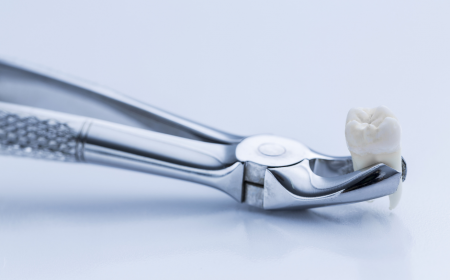
You may experience pain in the back of your mouth if your wisdom tooth does not erupt properly.
Despite the name, wisdom teeth have nothing to do with the life experiences and wisdom you have accumulated. Although most adults have four wisdom teeth, it is fairly common to have fewer than that or even none at all.
If you are considering having your wisdom tooth removed due to pain or infection, then this article is for you. Here, we provide a comprehensive overview of wisdom teeth, how they can be removed when necessary, and address some common questions along the way.
This article will cover the following topics:
- What are wisdom teeth?
- What are impacted wisdom teeth?
- How do I know if I have impacted wisdom teeth?
- Should I remove my wisdom teeth?
- How are wisdom teeth removed?
- How do I know if I require wisdom tooth extraction or surgery?
- How much does wisdom tooth extraction and surgery cost?
- What should I do before my wisdom tooth removal?
- What is it like following the wisdom tooth removal procedure?
- What should I do after my wisdom tooth removal?
- What are some complications of wisdom tooth removal?
- When will I be able to resume daily activities?
- Will I be able to chew normally after the wisdom tooth removal?
- Are there any risks with wisdom teeth removal?
What are wisdom teeth?
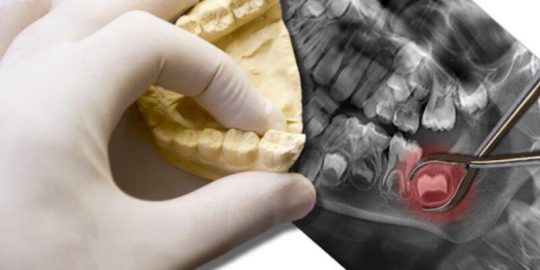
Wisdom teeth grow behind the second molar.
Wisdom teeth are a set of molars (sometimes known as the third molars) located at the back of the mouth – two in the upper jaw and two below. These teeth are the last adult teeth to emerge, typically between the ages of 17 and 25. Not everyone will develop a full set of four wisdom teeth.
What are impacted wisdom teeth?
In some cases, wisdom teeth may erupt through the gum line without complications. However, if there is not enough room, your wisdom teeth may grow in unusual angles and affect the surrounding teeth and gums. These are known as impacted wisdom teeth.
Types of impacted wisdom teeth
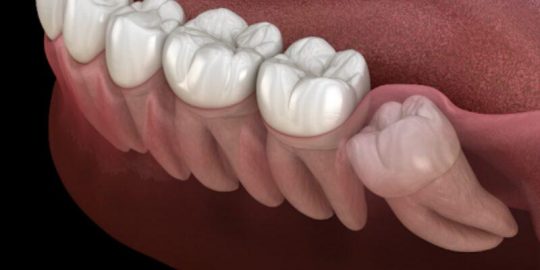
Wisdom teeth grow behind the second molar.
A fully impacted wisdom tooth remains beneath the gum tissue, while a partially impacted wisdom tooth is visible because it has not completely emerged from the gums. There are two main types of impaction: soft tissue impaction and bony impaction.
| Soft tissue impaction | Bony impaction |
|---|---|
|
|
Complications caused by impacted wisdom teeth
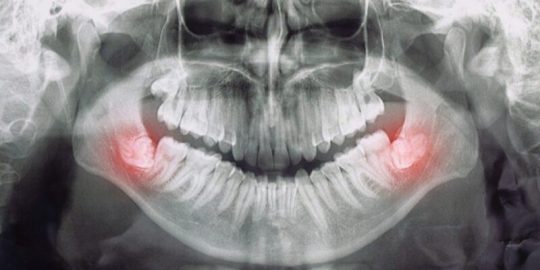
Wisdom teeth that grow in awkward angles will affect the neighbouring teeth.
An impacted wisdom tooth makes you more prone to tooth decay. Food can get trapped easily in the gap between a partially impacted wisdom tooth and the overlying gums, which may be hard to clean effectively. This creates the perfect breeding ground for bacteria and puts you at risk of gum disease. In fact, the bacteria can also cause the adjacent teeth to decay.
There is also a possibility that a cyst may form. This happens when a fluid-filled sac develops within the jawbone and soft tissue, just above the wisdom tooth. Although this is harmless in some cases, it may lead to other painful problems like nerve damage and should be addressed as soon as possible.
How do I know if I have impacted wisdom teeth?
You might feel pain or discomfort in your upper or lower jaw, accompanied by sensitivity or swelling of the gum tissue. If you develop gum infection as a result of an impacted wisdom tooth, you might experience symptoms such as persistent bad breath, an odd taste in the mouth, and bleeding gums.
That being said, it is possible that your impacted wisdom tooth does not cause any pain or discomfort. However, the absence of any symptoms does not necessarily mean it will not cause complications in the future.
Should I remove my wisdom teeth?
Yes, those with symptomatic wisdom teeth should get these removed as soon as possible. For wisdom teeth that are fully buried under the gums, we recommend for them to be removed only if there is a cyst developing.
How are wisdom teeth removed?
At NTUC Health Denticare, our dentist will take a dental X-ray and perform a thorough examination, before recommending the best course of action for you. The removal process involves either of the following procedures:
Wisdom tooth extraction
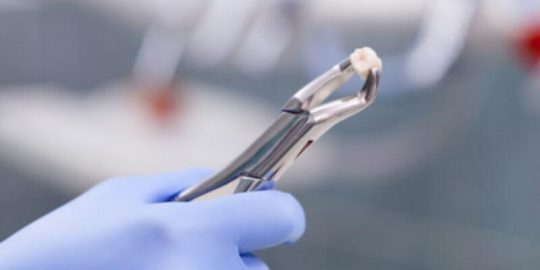
Wisdom teeth that grow in awkward angles will affect the neighbouring teeth.
Wisdom tooth extraction is a routine procedure that often takes between 15 to 45 minutes. During the procedure, the dentist will first inject the site with local anaesthesia. Next, dental tools are used to elevate and grasp the tooth. The tooth is then moved back and forth until the ligaments holding it in place are broken and it can be pulled out.
Wisdom tooth surgery
In cases where the wisdom tooth is impacted or particularly difficult to extract, wisdom tooth surgery may be necessary. This surgical procedure can be performed painlessly with local anaesthesia.
During wisdom teeth surgery, the dental surgeon makes a small incision to expose the tooth and surrounding bone. Several cuts may then be used to remove bone tissue and make the tooth easier to remove by splitting it into parts. Finally, the dentist will clean the area and stitch it up.
How do I know if I require wisdom tooth extraction or surgery?
In general, wisdom tooth surgery is required for more complicated cases, such as when the tooth is impacted. Your dentist will recommend the appropriate procedure after a thorough evaluation. We encourage you to discuss the benefits and risks associated with the procedure with your dentist as well.
How much does wisdom tooth extraction and surgery cost?
At NTUC Health Denticare, we offer both wisdom tooth extraction and surgery. Here are the fees for wisdom tooth removal at NTUC Health Denticare:
| Extraction | $65.00 – $190.00 |
| Impacted/Wisdom tooth surgery | |
| General dentist | $468.00 – $1,250.00 |
| Dental specialist | $1,100.00 – $2,000.00 |
CHAS subsidies are only available for wisdom tooth extractions, while Medisave claims are only available for wisdom tooth surgeries.
What should I do before my wisdom tooth removal?
Before the procedure, brush and floss your teeth thoroughly to minimise the risk of infection, and stay away from alcohol and tobacco. Avoid driving after wisdom tooth removal and arrange for someone to take you home as you may feel slightly groggy after the procedure.
We also advise you to have a light meal before wisdom teeth removal, as it may be difficult to eat or drink right after the procedure.
What is it like following the wisdom tooth removal procedure?
Although you may experience minor bleeding immediately after the procedure, this can be easily controlled by gently biting on the gauze given by the dentist. There is a chance that you may experience some pain, swelling, bleeding, discomfort or tightness in your jaw muscles over the next few days. In fact, this is perfectly normal as you heal. Following the procedure, our dentist will also prescribe pain medication that will help you to relieve the discomfort.
You may also experience numbness in some parts of your chin, lip or tongue. The effects of the local anaesthesia usually subside after a few hours.
What should I do after my wisdom tooth removal?
If you have just undergone wisdom tooth extraction or surgery, we would encourage you to read this detailed article on post-surgery care to ensure you heal as best as possible.
Essentially, the main aim of the healing process is to allow the blood clot to form and to keep the surgical site clean in order to minimise the risk of infection. The blood clot prevents excessive bleeding and protects the removal site so it can heal. You will need to avoid drinking with a straw, vigorous rinsing and consuming hot food or drinks.

To minimise infection, rinse your mouth with warm salt water.
To keep the wound clean, we recommend that you rinse your mouth (gently) 6 to 8 times a day with warm salt water. It is also important to continue brushing your teeth, including the neighbouring teeth, to avoid infection.
If your surgical site continues to bleed excessively even when pressure from the gauze is applied, you should contact your dentist immediately.
What are some possible complications of wisdom tooth removal?
Besides pain and swelling, you may experience other complications, though these are rare”
- Infection: Some tell-tale signs of an infection include persistent pain, tenderness and swelling. You may also feel feverish or notice pus draining from the removal site. Call your dentist if you feel the symptoms of an infection – they are usually minor and will go away with a local incision, drainage and a complete course of antibiotics.
- Tooth root fracture: If the roots of the wisdom tooth break off during the extraction, the dentist may decide to leave the roots as it is. However, this is only done when there is no disease present, or in the event that removing the root may pose further complications.
- Dry socket: This occurs when the blood clot is dislodged and the bone is exposed early in the healing process. Besides noticing the missing blood clot, you may experience severe pain or a foul taste in the mouth. If the pain does not subside (or worse still, intensifies), you should consult a dentist immediately.
- Numbness or altered sensation: While most numbness in parts of the gum or tongue is temporary and heals on its own, there are rare cases in which it is permanent.
Potential concerns about wisdom tooth removal
When will I be able to resume daily activities?

Rest is important in ensuring a smooth healing process.
People respond to wisdom tooth procedures differently and the recovery time can vary. With the aid of pain medication, you are likely to be able to go about your normal daily activities within a few hours if necessary. However, we would recommend you get as much rest as you can. Medical leave will also be provided for you to recuperate.
Will I be able to chew normally after the wisdom tooth removal?
It is best that you avoid chewing on the side of the mouth that has just undergone wisdom tooth surgery or extraction. Instead, we would advise you to drink plenty of cool or lukewarm fluids, and stick to chewing on soft food on the unoperated side of the mouth. This will allow the blood clot to form and ensure a smoother recovery. You will be able to eat normally once it is healed.

We recommend that you stick to soft foods for the first few days after the procedure.
Are there any risks with wisdom teeth removal?
Both wisdom tooth surgery and extraction are safe procedures. Complications are rare and most pain and discomfort following wisdom tooth surgery or extraction can be easily managed.
Summary
Wisdom tooth extraction or surgery may sound like a scary experience to some. However, it is a safe and common procedure that, if done early, can prevent more serious dental problems in the future, like tooth decay or cysts in the gums. If you are in your late teens or early 20s, why not ask your dentist about your wisdom teeth during your regular dental checkup?
Make an appointment today!
Call us at 6336 6222 or get in touch via our e-appointment form to book your appointment today!
